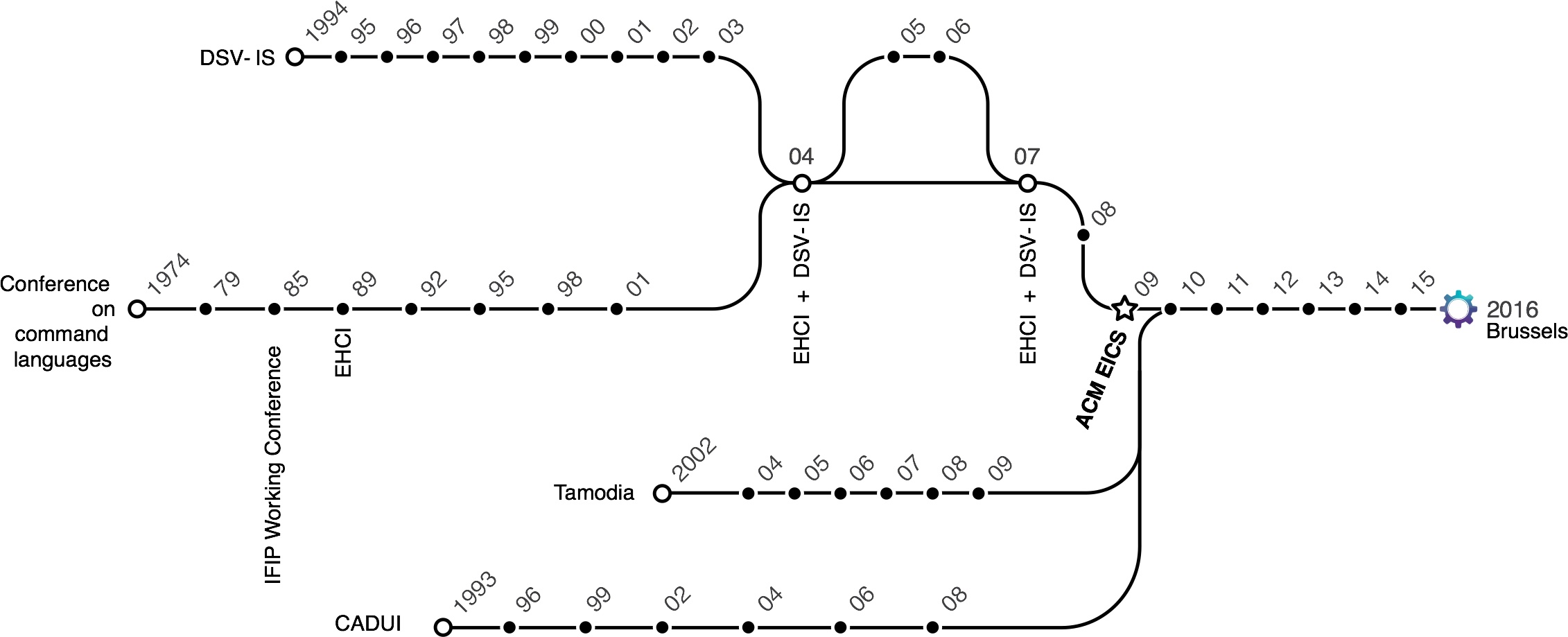About the conference
EICS is a yearly international conference devoted to engineering usable and effective interactive computing systems. Most of the research work
presented at EICS revolves around
Philosophy
Every ACM specialized SigCHI conference has a main theme. For EICS we want to gather people that aim to improve the ways we build interactive systems. Building interactive systems is a multi-faceted and challenging activity, involving a plethora of different persons and roles. Especially in the domain of HCI, where we continuously push the edge of what is possible, we need the appropriate processes, tools and methods to build reliable, useful and usable systems that help us cope with the ever increasing complexity of work and life. EICS primary goal is to provide a venue for novel contributions in this direction.
We seek for cutting edge research on engineering interactive systems. In engineering, beyond user testing, there is a need to worry about systematic validation and verification. Yet to make EICS a vivid and valuable forum, we will urge our community and reviewers to value and promote cutting edge research when selecting papers rather than focusing on completeness and fully proven approaches.
History
EICS might well be the longest running HCI conference in the field. Although it only has been an ACM SigCHI sponsored conference since 2009, EICS is a continuation and merge of a series of conferences, symposiums and workshops -- most notably the IFIP supported conference on Engineering HCI (EHCI) -- that shared a common interest: the engineering aspects of HCI. The annual workshops on Design, Specification and Verification of Interactive Systems (DSV-IS) and on Task, Models and Diagrams for UI Design (TaMoDia) were also merged into the EICS conference series, as well as the tri-annual International Conference on Computer-Aided Design of User Interfaces (CADUI).
A sample of EICS: Best Paper Awards
Will McGrath, Mozziyar Etemadi, Shuvo Roy, and Bjoern Hartmann. 2015. fabryq: using phones as gateways to prototype internet of things applications using web scripting. In Proceedings of the 7th ACM SIGCHI Symposium on Engineering Interactive Computing Systems (EICS '15). ACM, New York, NY, USA, 164-173. DOI=10.1145/2774225.2774835
2014:
Michael Nebeling, Elena Teunissen, Maria Husmann, and Moira C. Norrie. 2014. XDKinect: development framework for cross-device interaction using kinect.a> In Proceedings of the 2014 ACM SIGCHI symposium on Engineering interactive computing systems (EICS '14). ACM, New York, NY, USA, 65-74. DOI=10.1145/2607023.2607024
2013:
Pierre A. Akiki, Arosha K. Bandara, and Yijun Yu. 2013. RBUIS: simplifying enterprise application user interfaces through engineering role-based adaptive behavior. In Proceedings of the 5th ACM SIGCHI symposium on Engineering interactive computing systems (EICS '13). ACM, New York, NY, USA, 3-12. DOI=10.1145/2494603.2480297
and
Rui Alves, Pedro Valente, and Nuno Jardim Nunes. 2013. Improving software effort estimation with human-centric models: a comparison of UCP and iUCP accuracy. In Proceedings of the 5th ACM SIGCHI symposium on Engineering interactive computing systems (EICS '13). ACM, New York, NY, USA, 287-296. DOI=10.1145/2494603.2480300
2012:
Michael Nebeling and Moira Norrie. 2012. jQMultiTouch: lightweight toolkit and development framework for multi-touch/multi-device web interfaces. In Proceedings of the 4th ACM SIGCHI symposium on Engineering interactive computing systems (EICS '12). ACM, New York, NY, USA, 61-70. DOI=10.1145/2305484.2305497
2011:
Benjamin Tissoires and Stéphane Conversy. 2011. Hayaku: designing and optimizing finely tuned and portable interactive graphics with a graphical compiler. In Proceedings of the 3rd ACM SIGCHI symposium on Engineering interactive computing systems (EICS '11). ACM, New York, NY, USA, 117-126. DOI=10.1145/1996461.1996505
2010:
Andy Gimblett and Harold Thimbleby. 2010. User interface model discovery: towards a generic approach. In Proceedings of the 2nd ACM SIGCHI symposium on Engineering interactive computing systems (EICS '10). ACM, New York, NY, USA, 145-154. DOI=10.1145/1822018.1822041


